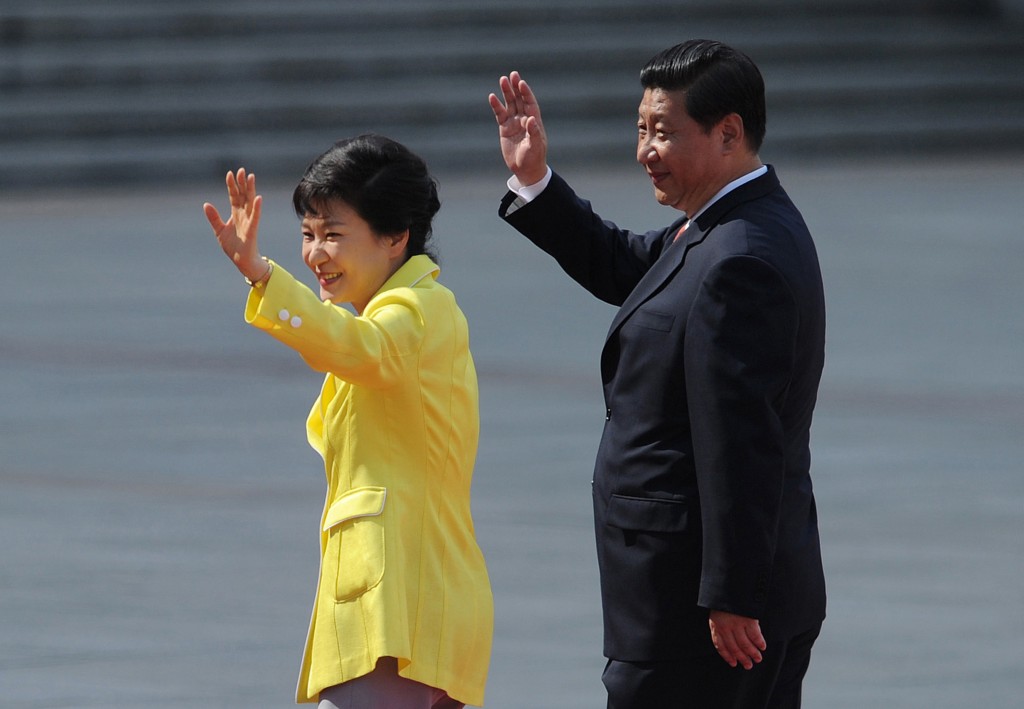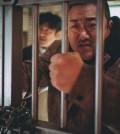- California Assembly OKs highest minimum wage in nation
- S. Korea unveils first graphic cigarette warnings
- US joins with South Korea, Japan in bid to deter North Korea
- LPGA golfer Chun In-gee finally back in action
- S. Korea won’t be top seed in final World Cup qualification round
- US men’s soccer misses 2nd straight Olympics
- US back on track in qualifying with 4-0 win over Guatemala
- High-intensity workout injuries spawn cottage industry
- CDC expands range of Zika mosquitoes into parts of Northeast
- Who knew? ‘The Walking Dead’ is helping families connect
China forces tough choice on S. Korea

Chinese President Xi Jinping, right, has increased pressure on South Korean President Park Geun-hye to make an either/or choice between Beijing and the United States. (AP)
By Yi Whan-woo
China has increased pressure on South Korea to make an either/or choice between Beijing and the United States on two key issues.
“It would be appreciated if South Korea takes China’s interest and concerns over THAAD into deep consideration,” Chinese Assistant Foreign Minister Liu Jianchao told reporters after meeting Deputy Foreign Minister for Political Affairs Lee Kyung-soo in Seoul.
THAAD is an acronym for Terminal High-Altitude Area Defense (THAAD), an anti-ballistic missile system developed by the U.S. military.
“I delivered China’s stance over those issues and I hope the U.S. and South Korea show sound judgment,” Liu said. “We exchanged our thoughts honestly and freely over THAAD-related issues.”
Beijing also renewed calls for Seoul to join the China-led Asian development bank, a move widely seen as challenge to the U.S.-led international financial order.
Liu arrived in Seoul, Sunday, for a four-day visit amid a growing confrontation between Washington and Beijing over thorny issues, mainly THAAD and the Asian Infrastructure Investment Bank (AIIB).
South Korea is at the center of the dispute between the world’s two super powers.
According to military sources, Washington has included THAAD as part of military support it would provide to South Korea in case of an emergency on the Korean Peninsula.
THAAD can intercept and shoot down a wide variety of ballistic missiles at higher altitudes than any other defense system that South Korea uses.
And Washington recently hinted at the deployment of a THAAD battery on Korean soil to better deter North Korea’s growing nuclear and missile threats.
But Beijing has protested against such a move, claiming THAAD is targeting China as part of U.S efforts to enhance its hegemony in East Asia.
South Korea has yet to decide whether to allow the U.S. to deploy THAAD here at all times and has maintained strategic ambiguity to appease China.
Liu also said he hoped South Korea would become a founding member of the AIIB.
“I explained the progress that is being made to establish the AIIB,” he said. “And the South Korean side responded that it will consider the overall benefits and losses that it may have by joining the AIIB before making its decision.”
South Korea is in a dilemma over whether to join the AIIB after the U.K., a key U.S. ally, said Friday it would join discussions to become a founding member.
In particular, China, South Korea’s largest trading partner, has asked the government to decide by the end of this month, according to the Ministry of Strategy and Finance.
China, the world’s second-largest economy, claims the AIIB will be transparent in its goal to provide infrastructural funds to clients in the Asia-Pacific region to offset its limited influence in global banks such as the World Bank and the International Monetary Fund.
However, the U.S. is concerned about whether the new investment bank would meet the standards of the World Bank and other regional banks in terms of governance, lending standards and procurement rules. Liu will leave for Japan on Wednesday.
Washington and China have sent respective senior officials to Seoul this week.
Daniel Russel, the U.S. assistant secretary of state for East Asian and Pacific affairs, arrived here Monday. He is exclusively visiting South Korea for two days to meet Vice Foreign Minister Cho Tae-yong and Lee.












![trump[reuters]](http://www.koreatimesus.com/wp-content/uploads/2024/05/2023-06-10T235115Z_520439966_RC2NG1AXVQJW_RTRMADP_3_USA-TRUMP-copy-120x134.jpg)


